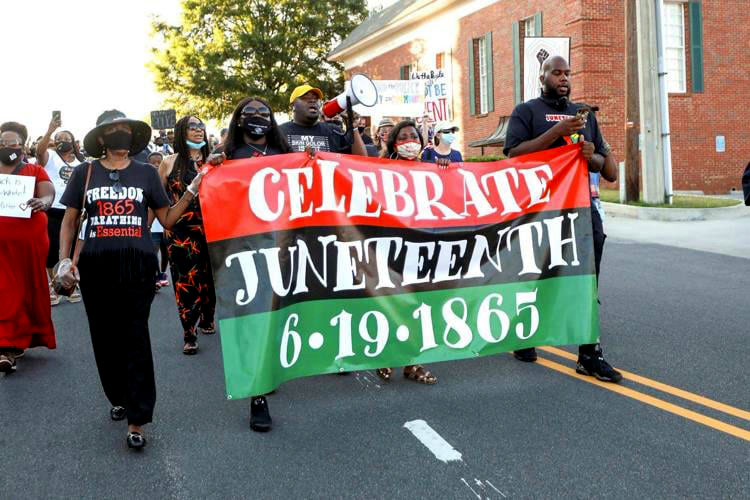SPEAKIN’ OUT NEWS
June 19, 2024 – Across the United States, communities are coming together to celebrate Juneteenth, a holiday commemorating the end of slavery in America. This day, which has gained national recognition, is a time for celebration and reflection on the continuing journey toward equality and justice.
HISTORICAL ROOTS
Juneteenth, also known as Freedom Day, Jubilee Day, and Emancipation Day, marks the day in 1865 when Union General Gordon Granger arrived in Galveston, Texas, to announce the end of the Civil War and proclaim freedom for enslaved people. This came two and a half years after President Abraham Lincoln’s Emancipation Proclamation, which declared on January 1, 1863, that all enslaved people
in the Confederate states were to be set free. However, enforcement of the Proclamation generally depended on advancing Union troops. Texas, one of the most remote slave states, had little impact from the Emancipation Proclamation due to minimal Union presence.
When General Granger and his troops arrived in Galveston on June 19, 1865, they brought with them General Order No. 3, which announced the total emancipation of enslaved people:
“The people of Texas are informed that, in accordance with a proclamation from the Executive of the United States, all slaves are free. This involves an absolute equality of personal rights and rights of property between former masters and slaves, and the connection heretofore existing between them becomes that between employer and hired labor. The freedmen are advised to remain quietly at their present homes and work for wages. They are informed that they will not be allowed to collect at military posts and that they will not be supported in idleness either there or elsewhere.”
The newly freed African Americans met the announcement with shock and jubilation. June 19 became a day of celebration, marking the end of one of the darkest chapters in American history.
Growing Recognition
1980, Texas became the first state to make Juneteenth an official state holiday. Over the years, more states followed, and in 2021, Juneteenth was officially recognized as a federal holiday, a significant milestone in American history. This recognition has helped to elevate the day’s importance, prompting schools, businesses, and government institutions to observe and honor its significance. As a result, many Americans have gained a deeper understanding of the country’s history of slavery and the enduring impact of systemic racism.
Celebrations Across the Nation
Juneteenth celebrations vary widely, reflecting the diverse ways communities honor their history and heritage. Parades, music festivals, educational seminars, and family gatherings are common. In cities like Houston, New York, and Los Angeles, large-scale events attract thousands, featuring performances by local artists, historical reenactments, and speeches by community leaders.
Reflecting on Progress and Challenges
While Juneteenth is a day of celebration, it is also a time for reflecting on the progress made and the work still to be done. The legacy of slavery continues to influence American society, manifesting in racial disparities in wealth, education, healthcare, and criminal justice.
According to the Southern Poverty Law Center and the Brennan Center for Justice, Healthcare dispari- ties are pronounced. Black Alabamians experience higher rates of chronic illnesses and have less ac- cess to quality healthcare services. This lack of ac- cess contributes to poorer health outcomes, includ- ing higher infant mortality rates and shorter life expectancies compared to their white counterparts.
The criminal justice system in Alabama shows stark racial disparities, particularly affecting Black youth. According to a report by the Southern Poverty Law Center, Black youth are disproportionately pushed out of schools and into the juvenile justice system, often ending up in abusive and costly detention facilities. These facilities prioritize profit over rehabilitation, exacerbating the cycle of incarceration and reducing chances for these young individuals to lead successful lives.
Legislative actions in Alabama also reflect ongoing racial biases. For instance, various bills have been introduced that criminalize behaviors and medical procedures disproportionately affecting Black and marginalized communities. Efforts to reform the criminal justice system, such as repealing the Habitual Felony Offender Act, face significant hurdles despite the clear need for change to address sentencing disparities and prison over- crowding (Smart Justice Alabama).
Understanding these disparities underscores the importance of Juneteenth as a day of reflection and action. It reminds us of the long journey toward true equality and the need for continued efforts to address and dismantle systemic racism in all its forms.
Looking Ahead
As Juneteenth continues to grow, it reminds us of the nation’s complex history and the importance of ongoing efforts to achieve true equality. It inspires hope and action, encouraging all Americans to engage in meaningful conversations and take steps toward a more just and inclusive society.
Juneteenth is more than a commemoration of a historical event; it is a powerful symbol of resilience and the enduring fight for freedom and justice. In Alabama, strides have been made in addressing the remnants of slavery, but the battle against racism and bigotry continues. As the nation celebrates this significant day, it offers a moment to honor the past, acknowledge the present, and commit to building a better future for all. By confronting the challenges head-on and fostering a spirit of inclusivity and equity, we can continue to make meaningful progress towards a more just society.











